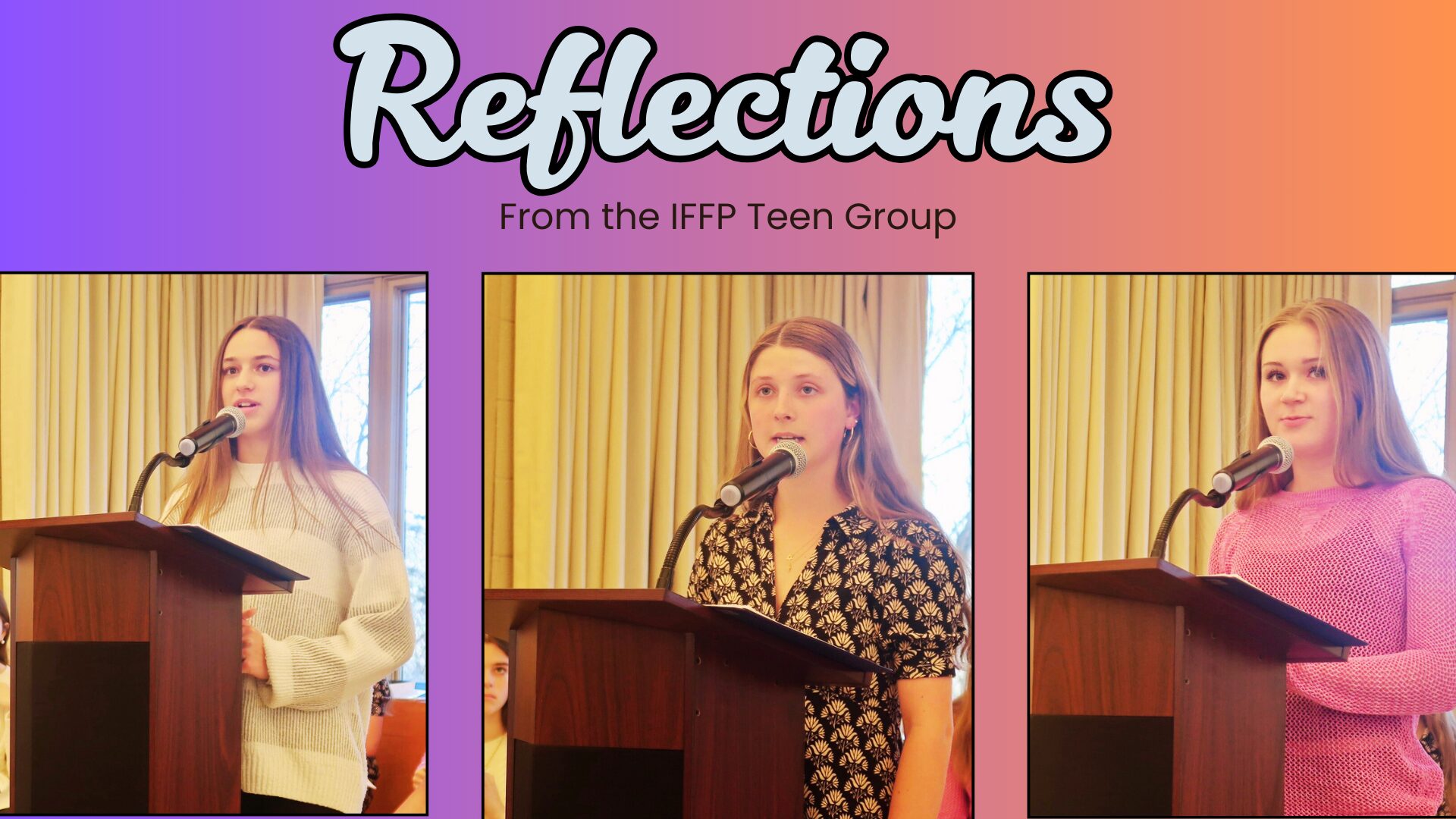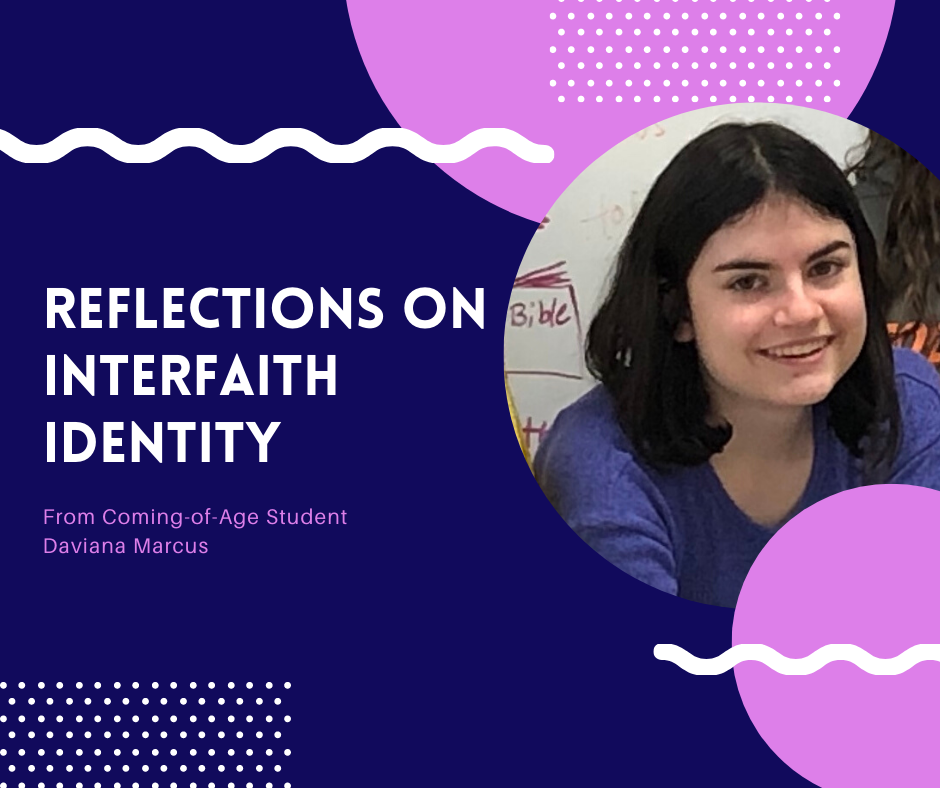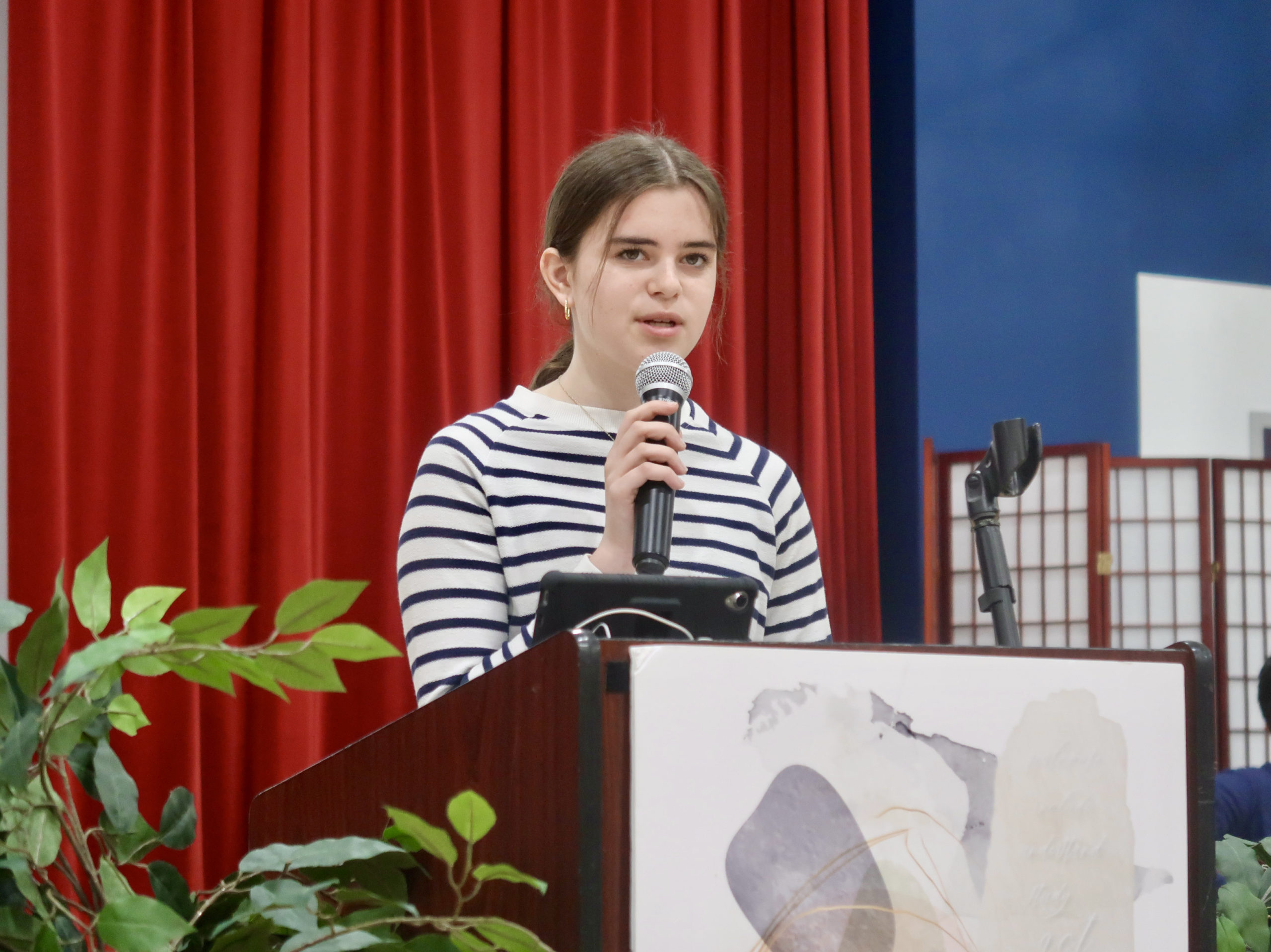At this year’s IFFP Teen Group Gathering, we reflected on a powerful passage from Luke 5:1-11 — the moment when Jesus calls his first disciples. From this story, we each found a message that resonated with our own lives and experiences. Together, we explored the idea that every person is worthy, and that believing in your own worth can build the faith and strength needed to move from doubt into hopeful action.
PART 1: God Reminds Us That Everyone is Worthy
Reflection by Nora Thompson
Do you remember that feeling when the teacher asked for someone to demonstrate a problem on the board and everyone turned to look to see who would do it? What stopped you from volunteering? What about when a special task was offered at work from your boss and you shied away from that opportunity because you were too scared?
This feeling of self-doubt and unworthiness is a common, shared experience that I imagine everyone in this room has felt at some point in their life. Things like: It’s going to be too hard for me, I’m not good enough, what if I mess up in front of everyone? As someone who is a performer and frequently on stage this is something I have grown up with. Just this past weekend at a dance convention, I went up to the front of my group so that my teacher would have a better shot at noticing me. He turned out to be Chris Brown’s choreographer, but it ended up being my worst time doing it because I was so in my head about messing up. Our brains are extremely powerful tools that can keep us from doing dangerous things, but sometimes it misinterprets a new opportunity as a threat.
In our text today Simon is reluctant to release the nets. He doesn’t want to show his mentor that he will come up empty handed and not be able to provide for him. He already feels like he shouldn’t be in the presence of Jesus so why should he try? But Jesus reassures him and loves him even though he is a sinner. Jesus offers him a new opportunity and a new way of life far more critical and fulfilling than fishing. Simon was lucky that he was able to be shown that his fixed mindset on himself was wrong and that he could have an even greater impact on his community.
So, this text leaves us wondering…what happens when no one is there to show you the possibilities? What happens when you don’t get that reassurance that who you are is enough?
In our digital society today hatred and negativity is shared without a thought to who might be on the receiving end. And while people have always said hurtful things to each other it seems like there has been an increase in hostility for people of all ages against other people who don’t look or seem like them.
From what I have experienced, the younger generations are now saying harsh things in person that were once only said online. Even though it shouldn’t be said at all, the impact of hearing it face-to-face is causing significant consequences.
As some of you may have heard, a few weeks ago, an 11-year-old girl in Texas, named Jocelyn, was being bullied at school about her immigration status. While she was born in the U.S., some of her peers claimed that her family would get deported and she would be left behind. Tragically, on February 8th, she took her own life.
Let’s take a moment and place ourselves in her shoes. Can you imagine being so young and hearing such terrible things? And then, truly believing that your life doesn’t have worth? Some of us here have personal connections to this feeling and this experience is happening for too many people for it to go unnoticed. If Jocelynn felt like there was no one who could reassure her, then how many more people are feeling that way? And most importantly, what can we do to support them?
In our text today, we saw that all it took for Simon was a little belief from God to remind him of his worth and lift him up. Knowing that we are loved helps us love other people, so, whether it’s God or someone else who brings you peace, you can always turn to them when you feel that sense of unworthiness start to creep in.
As I said before, your brain is a powerful tool that can make one small, terrible moment seem like the end of the world. But it can also be used to empower yourself, especially if you recognize that messing up is not failing, It’s always worth trying again.
Once you use this mindset for yourself you can share it with other people. You can be their source of empowerment. Even something as simple as inviting them to sit with you at lunch or taking the time to have a conversation with a coworker you don’t normally speak to can make a world of difference.
Today’s story tells us that every single person is worthy of love. So, let’s do all we can to remind people – every day – to keep dreaming and keep going. We have good work ahead of us.
PART 2: God Shows Us That Faith is a Powerful Tool
Reflection by Elena Kleiner
Ever since I was a little baby, I’ve loved to swim. I wouldn’t say I’m passionate about it, or even that I’m very good at it, but I love it and it’s been the highlight of my summer for the past 15 years.
When I was in elementary school, my friends had started swimming in meets and my parents were excited about signing me up for races, but I just wouldn’t do it. I had swum and practiced my dives thousands of times before, but there was so much fear in me, I couldn’t bring myself to race. My dad would pick me up and put me on the side of the pool, urging me just to jump in, but I wouldn’t do it. I wasn’t ready, even though the world was telling me I was. Then, one summer after my parents, friends, and coaches had bugged me enough, I just decided, why not try one swim meet? So I did, and I’ve swam in every meet every summer since then. It’s not that I don’t still get pre-race nerves, but I’ve just learned to swim with fear instead of letting it get in my way.
I may not have realized it at the time, but through all of this, God was with me. When I refused to swim, I didn’t know how to trust that God was there to guide me in my doubts. When I finally chose to swim at that first meet, I was choosing to just roll with it, trusting that God had my back, even though I was nervous. Now, I feel God’s presence through my adrenaline every time I race.
In today’s text, we hear Jesus say, “don’t be afraid.” He is imploring Simon to trust him and not to second-guess himself, even though Simon has already given up on the idea of going into deeper waters. Jesus is urging Simon to trust him, and to trust God, instead of dwelling on the past or worrying about the future.
Now, my swim story is pretty lighthearted. I wouldn’t say it was a very high risk situation, even though that’s what I made it out to be in my mind. I’m sure we can all relate to this. But Jesus’s message to Simon still resounds in this. Don’t be afraid – don’t play into your doubts – don’t stop here. Because I, an embodiment of God’s love, am with you.
For some of us here, trusting God might mean trusting God’s plan or leaving everything in God’s hands. For me, this means trusting that God is with us and loves us through it all, through our doubt, and through our fears.
This message can remind us of Micah 6:8 – “and what does the Lord require of you but to do justice, to love kindness, and to walk humbly with your God?” This verse solidifies what Jesus is telling Simon to do when he’s afraid. God doesn’t want us to fixate on the past or be afraid of what is to come. We are meant to walk with God, trusting that God is there during times of fear. The prophet Micah tells us to act on our reverence for God, feeling God’s presence as we work to create a better world. [Our own action and belief in progress], in tandem (+) with [the energy of God’s love], (=) is the strongest force.
So, what does this mean for us today? We aren’t exactly expecting our boats to overflow with fish the second we aren’t afraid and finally feel God’s presence all around us. Right now we are living in a time of a lot of uncertainty. Many people we know, or even some of us in this room today, have lost our jobs. We see life changing federal programs being eliminated, leaving many people of all ages especially vulnerable. For some of us, it feels like a grim future is inevitable for our country and we are stuck in a place of misunderstanding one another. In these circumstances, it can feel hurtful to think these turbulent waters are a part of God’s plan. Instead, the trust for God can come in feeling God’s presence with us as we work to address the issues we face together. Instead of letting our trust in God create a feeling of complacency in our situation, let it create a notion of determination to make a change.
Jesus tells Simon to fish in deeper waters, even when it didn’t work before. Simon is very reluctant to try again, because he didn’t trust that God being by his side was enough. If America’s founders had the same mentality as Simon, would our country be a democracy today? If abolitionists had the same mentality as Simon, would all people in our country be free? If civil rights activists had the same mentality, would our nation be integrated? If suffragists had the same mentality, would half the people in this room be allowed to vote? If our founding mothers had the same mentality, would we be here together today? If my parents of two different religions and backgrounds had the same mentality, would I even be here?
Knowing that God is present is a powerful tool to face our fears and to keep trying. With God’s love on our side, we can do just as Jesus tells us. “Don’t be afraid.”
PART 3: God Invites Us to Help Shift the Tide
Reflection by Harper Kelly
When we trust and have faith in God, it allows us to see a path of hope; but we must have the courage and perseverance to take the first steps. Simon says to Jesus, “Master, we have worked all night long but have caught nothing. Yet if you say so, I will let down the nets.” The fishermen trusted Jesus when he told them to go to deeper waters, even after they had spent all day pulling up empty nets. He made them hopeful that they could catch fish. But Jesus didn’t materialize dozens of fish in their nets just because they believed in him. The fishermen had to have the grit and determination to go back out and try again. Even when they were exhausted and could’ve easily given up, they took action.
We can see other examples of this in our history. There were Jews who resisted against the Nazis. Jews who participated in the Warsaw Ghetto Uprising, who joined armed resistance groups, and who were imprisoned in concentration camps where they executed their own acts of rebellion. In the darkest waters, these heroes had faith. They were able to see a hope for the future where the Nazis’ oppression could be destroyed. But believing that wasn’t enough to actually make it a reality – they needed to take action. God can show us the path and empower us to believe in change, but we must have the courage to get up and do something about it.
Today, antisemitism is rampant in our society: on college campuses, in workplaces, in the news. It’s incredibly distressing to me, and I know for many of us as well. My best friend lives in LA and her mom, Samantha Ettus, is a Jewish Pro-Israel activist. Their house burned down in the Palisades wildfire. And although their family was flooded with messages offering support, they were also sent messages, taunting, “Glad you lost your home! Next time I hope you’re in it.”
This inhumanity and cruelty has no place in our society. But I can feel at a loss about how to address it and create change. I find myself feeling helpless and I suspect this isn’t a solitary sentiment.
But there is hope. The passage about the fishermen can teach us an important lesson about times where things feel bleak or hopeless. First, we need to have faith in God and allow ourselves to see a path forward. Like I mentioned at the beginning, the fishermen believed and trusted Jesus even when their nets were empty. And they were filled. So even when things may seem dark, trust God that they will get better.
Second, we cannot stay silent. Allowing ourselves to hope for a better future is not enough. Wishful thinking will not fill our nets. Like the fishermen, we need to persevere, even in these difficult moments, and take action. Educate your non-Jewish friends on antisemitism. Speak up when you hear antisemitic jokes or comments. Focus your energy on things you can control. Model the behavior you want to see in the world.
When we all recognize that there is hope and take those brave steps of action,
we can turn that hope into a reality, and we create a better world.






